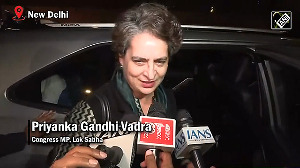Consumers will be paying around 20 paise a litre more for petrol and diesel after the elections with both the finance and petroleum ministries deciding in favour of levying a "special purpose cess" on the two fuels to finance strategic crude oil reserves of five million tonnes.
The two ministries have preferred the option of a cess over drawing on a budgetary grant. The cost of the project has been estimated at Rs 6,540 crore (Rs 65.40 billion) -- Rs 1,640 crore (Rs 16.40 billion) as capital cost and Rs 4,900 crore (Rs 49 billion) on account of the cost of crude. The project has been cleared by the Cabinet.
The strategic crude oil reserves are considered necessary to meet contingencies arising out of supply disruptions.
The five million tonnes reserves will be equivalent to about 19 days' cover on an import basis in 2006-07 when the reserves are expected to be in operation, and 14 days' cover on a consumption basis.
The crude purchase costs are based on the assumption of an average exchange rate of Rs 48 per $ and an average crude oil price of $ 26.71 a barrel for the period April 2002 and March 2003.
The government proposes to create a special purpose vehicle, 100 per cent owned by Indian Oil Corporation, to manage the strategic storage system.
The SPV will have the ownership and control of crude oil inventories and will coordinate the release and replenishment of crude stock.
The 'special purpose cess' would be levied and collected as excise and customs duties on all the indigenously produced and imported petroleum products.
For this, the provisions of the Central Excise Act, 1962 will be made applicable to levy and collection of this cess as well.
The cess would be credited to a strategic storage fund directly. The SSF will be under the government's control and is to be utilised only to meeting the cost of maintaining the strategic storage reserves.
The cess will be adjusted once a year to neutralise the impact of crude oil price fluctuations, changes in taxes, duties and levies, and exchange rate fluctuations.





